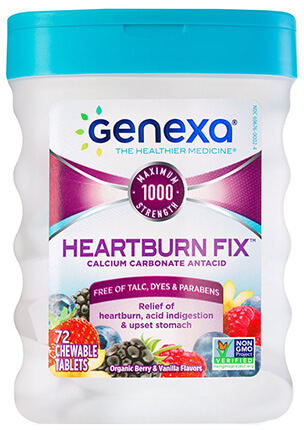
How to Get Rid of Heartburn
We’ll come back to the heartburn.
This year, researchers at MIT and Harvard Medical School published a study about the classic medications and over-the-counter drugs in our medicine cabinet. And: They’re likely filled with the same food additives and chemicals that we try to avoid in our diet, beauty products, and cleaning supplies.
Which is why we got more curious about Genexa, a pharmaceutical company founded by two dads who wanted to create better, cleaner medicine options for their families. All of Genexa’s products are made with organic and non-GMO ingredients from sustainable sources. The products range from homeopathic medications to cleaned-up OTC staples, like Heartburn Fix.
Think of Heartburn Fix as your quick solution after a big meal with a supersize glass of wine, says Joel Kahn, a Michigan-based cardiologist who serves on Genexa’s medical advisory board. And if you’re getting down to the root causes of heartburn, yes, it’s primarily dietary and lifestyle changes that can make a difference.
A Q&A with Joel Kahn, MD
Heartburn is a symptom that most people describe as burning, sometimes more sharp or painful, anywhere from the upper chest to slightly below the belly button. It’s caused by acid from the stomach rising into the esophagus, which doctors call gastroesophageal reflux disease (GERD). The stomach is a pretty amazing organ that can tolerate incredibly strong acid that would burn your skin. But if that acid gets up into your esophagus, which isn’t designed to be bathed in acid, it can burn quite significantly. So GERD and acid reflux can be a reason for heartburn.
Heartburn is classically brought on after a large meal or after eating spicy food, tomatoes, wine, or chocolate. Most people know if they have heartburn because they had a big meal and overdid it, but if it’s an exceedingly frequent symptom, that might bring a patient to discuss it with a health care practitioner. The bigger problem is that there are also serious heart conditions that may cause burning in the chest.
If it’s a burning sensation after a large meal that involved spice, tomatoes, alcohol, or chocolate and you take an over-the-counter agent and feel better in ten minutes, it’s heartburn. If you’re fifteen years old, you can almost certainly categorize it as acid-based heartburn. But if you’re fifty-five years old, you should at least pause for a second to consider whether it’s classic heartburn.
If you feel burning in your chest when you’re on the treadmill, and you’re feeling a bit weak and short of breath, that’s not usually when heartburn happens. If it lasts a long time and you’re also sweating and nauseated, you should get medical care. If it goes on for more than fifteen minutes and it just doesn’t feel like typical heartburn, call 911.
Don’t eat late at night. The worst offender is a big dinner with wine late at night, then you go right into bed, lying flat. If you violate that rule and do have a giant meal late at night with wine, it might be helpful to try to sleep propped up on a few pillows. Don’t wear tight clothing late at night—it can press on the stomach and make it more likely that some of the contents, including acid, will get up into the esophagus.
“The worst offender is a big dinner with wine late at night, then you go right into bed.”
Be aware of certain foods that trigger your heartburn, like the classic ones: tomatoes, chocolate, wine, spicy foods. Avoid them if they’re causing you problems. Drink water while you’re eating. Chew while you eat, and take a mindful approach to eating, which gives your digestive tract a little more time to work on the food you’ve eaten and move it through.
Some people respond to avoiding gluten or dairy in their diet. If you’re having significant heartburn, you might want to see a physician, but if you want to experiment on your own with an elimination diet, you could try eliminating dairy or gluten for three or four weeks.
There are people who adopt a plant-based whole-food diet, which is my favorite because for one, it’s going to be free of dairy, and two, it’s going to be less processed and have fewer chemicals. Also, plant-based foods are naturally more basic, while meat-based foods are naturally more acid-forming. Transitioning toward a more plant-based diet can greatly relieve heartburn.
People will generally buy over-the-counter agents unless it becomes a chronic and significant problem for which they seek medical attention and might get a prescription. But it’s usually an over-the-counter approach to a generally bothersome but benign medical condition.
For an acute episode of heartburn, you’re not going to reach for Pepcid and Zantac, which are histamine 2 blockers that reduce the amount of acid your stomach produces. They would take time to act, and right now Zantac has been recalled nationwide because of a contamination issue. But all that set aside, it’s not going to work rapidly.
Calcium carbonate can work quickly. Five minutes after taking it, you can feel relief, and it’s a much more reasonable choice because calcium carbonate is neutral and can return the pH of the stomach or the esophagus to normal.
Until about two, three years ago, there was no real conversation about the quality of prescription and over-the-counter drugs. We had sort of a naive concept that these were being made in a way that favored our health. But in many of these over-the-counter, routinely bought solutions for heartburn, the active component that’s supposed to quell the heartburn can be less than 50 percent of what’s in the tablet or the capsule. And the rest may be lactose or sugars that are hard to digest (like FODMAPs) that could cause some GI upset. Which is rather surprising given that up to 90 percent of adults of East Asian descent are lactose-intolerant and up to 65 percent of the world has trouble digesting lactose.
You start to wonder, when people say, “Well, I took that over-the-counter agent, and it didn’t give me much relief,” did it not give them much relief because the tablet contained as much or more GI-upsetting substance as GI-remedying substance?
“You start to wonder, when people say, “Well, I took that over-the-counter agent, and it didn’t give me much relief,” did it not give them much relief because the tablet contained as much or more GI-upsetting substance as GI-remedying substance?”
I’m also very concerned about the literature that suggests that the enormous exposure we all have to industrial chemicals, plastics, and endocrine-disrupting chemicals has a real and serious impact on our health, endocrine function, fertility, and obesity. And it is really troubling that so many of these over-the-counter tablets have been shown to contain parabens and phthalates that could affect your fertility, your thyroid, and weight. There is no benefit to including lactose, parabens, and hard-to-digest sugars in over-the-counter medications. It’s just been the cheap and traditional way to make these drugs. And it’s not only that prescription generic medications may have filler and more allergen-provoking substances; now we’re also worried that the manner in which they’re being produced is contaminating the drug (as in the case of Zantac).
Genexa has removed common allergens, like hard-to-digest artificial sugars and lactose, as well as certain fillers that can upset the GI tract. In Heartburn Fix, Genexa has removed artificial dyes, artificial flavors, artificial preservatives, and any gluten contamination. The active component of Heartburn Fix is the same active component, calcium carbonate, as most standard over-the-counter heartburn drugs. It works—it just isn’t accompanied by potentially health-deteriorating garbage that is brought along with most other products.
It’s clean medicine. There always should have been clean medicine, but we’re learning that we’ve got a ways to go, and this is the first bright spot there is. This is just one small part of the whole picture, but it’s going to take small steps like this to make a difference in our health.
Joel Kahn, MD, is a cardiologist and founder of the Kahn Center for Cardiac Longevity. He is a clinical professor of medicine at Wayne State University School of Medicine and graduated summa cum laude from the University of Michigan Medical School. He has published more than 150 scientific papers and five books, including The Plant-Based Solution. He is also the owner of GreenSpace Café near Detroit.
This article is for informational purposes only, even if and regardless of whether it features the advice of physicians and medical practitioners. This article is not, nor is it intended to be, a substitute for professional medical advice, diagnosis, or treatment and should never be relied upon for specific medical advice. The views expressed in this article are the views of the expert and do not necessarily represent the views of goop.
